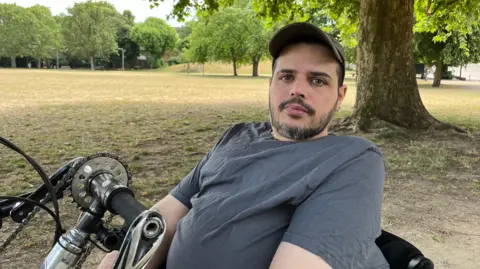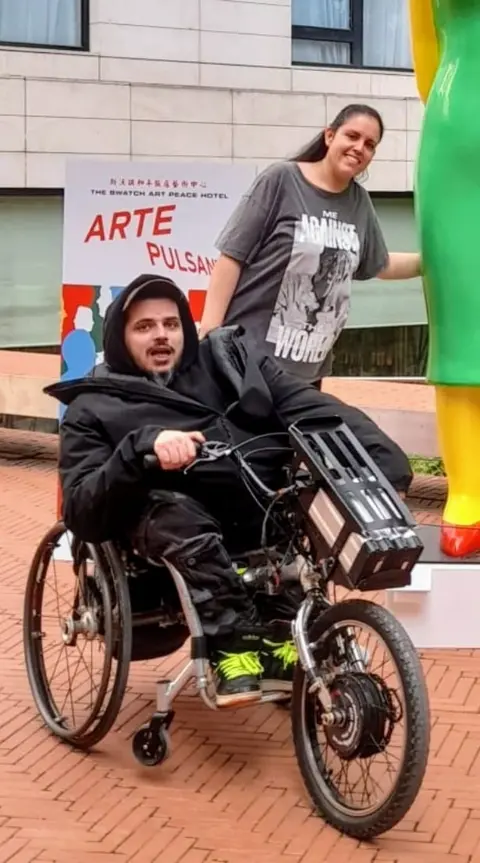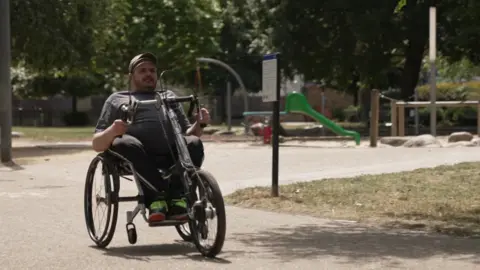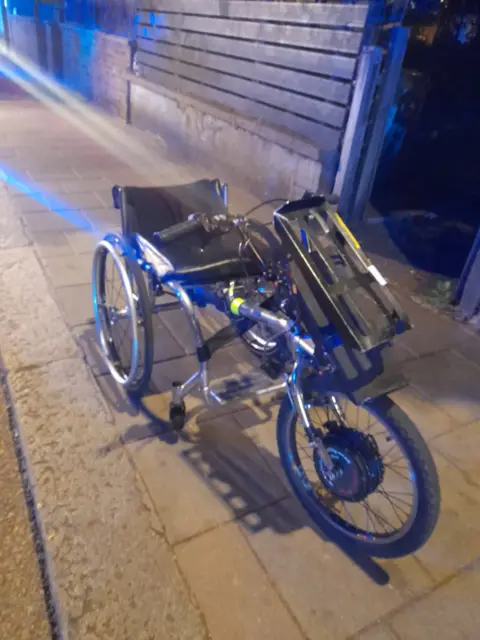'The Met Police confiscated my wheelchair for 19 days'
 BBC
BBC"It's my legs. Without it I can't move, it's like losing my independence."
Israel Vidal couldn't believe it when the Met confiscated his wheelchair. His crime? Using an electric attachment on his wheelchair to help tow him around.
He was without his wheelchair for 19 days. "It was horrible. I lost complete independence," he says. "I felt like I'd done something wrong. I couldn't go to the toilet on my own, couldn't go out on my own, I lost my independence.
"I felt like it was unjust. It was very frustrating, it felt like they weren't using common sense. I felt like I was being ignored more than anything."
Isra fell out of his wheelchair on 9 May in Brixton, south London, and was knocked unconscious.
He'd been to a concert with his sister on his birthday.
He was taken to King's College Hospital and when he came round he was told his purpose-built wheelchair had been confiscated.
"I landed on my head and lost consciousness, woke up in the hospital and the police had taken my chair," Israel tells me. "Apparently, the chair is illegal to them."
The Metropolitan Police has apologised for keeping the wheelchair "longer than anticipated".
 Israel Vidal
Israel Vidal"It's still not clear to me why it's illegal," Isra adds. "When I woke I was given a paper saying I didn't have insurance or registration, but it was a power attachment. It wasn't a vehicle.
"They took my personal wheelchair. My sister told them at the time that the power attachment came off but they refused to return it.
"The hospital staff told them, the occupational therapist told them. They refused. My GP told them, they refused. It was only after three weeks and MPs getting involved and charities got involved that they decided I should get my wheelchair back."
Isra had been given a standard wheelchair by the hospital which he couldn't sit in properly.
It meant he was housebound and lost his independence. His blood pressure also increased and he had to be admitted to hospital again.
'House arrest'
Electric attachments are a popular way for many wheelchair users to increase their mobility. The devices have an electric motor which can pull the user along.
But at the moment, they are classed as motor vehicles and are illegal without insurance and registration.
Campaigners say the law is out of date and are lobbying the government for it to be changed.

Although Isra got his wheelchair back after nearly three weeks, the Met Police still has his electric attachment.
He says he has only been in contact with the Met via email.
"I would like some guidelines so people with disabilities don't suffer the same thing," he says. "People need their personal equipment with them unless there's a just cause."
He adds: "An apology would be nice, but it's up to them.
"I've used the power attachment for years. I've taken it on planes, on trains and I've never had any problems."
 Israel Vidal
Israel VidalCharities want the government to issue guidance to police for officers to use their discretion and not confiscate electric attachments.
They also say in no circumstances should someone's conventional wheelchair be confiscated as happened in this case.
Isabelle Clement from the charity Wheels for Wellbeing says the response was totally out of proportion.
"We want it first of all for it to be established that nobody should be confiscating anyone's wheelchair.
"It is as if they are confiscating their legs and putting them under house arrest. There is currently, bizarrely, no guidance for the police to say the police must not confiscate anybody's wheelchair.
"That we would like established really quickly. There should be no argument about it, it's absolutely common sense.
"In this instance, because there was an electric attachment, they took the whole lot even though they were told they could be detached. So we would like government to very quickly clarify this, so no-one never again confiscates wheels and therefore their legs."
'Second-rate citizen'
Isra says the experience made him feel marginalised and forgotten.
"I would like some guidelines so people with disabilities don't suffer the same thing," he tells me. "People need their personal equipment with them unless there's a just cause."
He adds: "I've never had any problems with the police but I've been treated like a second-rate citizen, which has been very strange but I hope this doesn't happen to anyone else."
The Metropolitan Police said in a statement: "On 9 May a man sustained minor injuries after an incident in Brixton involving a modified wheelchair. Due to concerns about the safety risks to the man and wider public the wheelchair was seized. A replacement wheelchair was provided by the hospital he attended.
"We are aware of a complaint and regret that the modified wheelchair was held longer than anticipated. We apologise for any distress this has caused its owner and have refunded costs incurred as a result of the wheelchair being impounded."
Listen to the best of BBC Radio London on Sounds and follow BBC London on Facebook, X and Instagram. Send your story ideas to [email protected]
